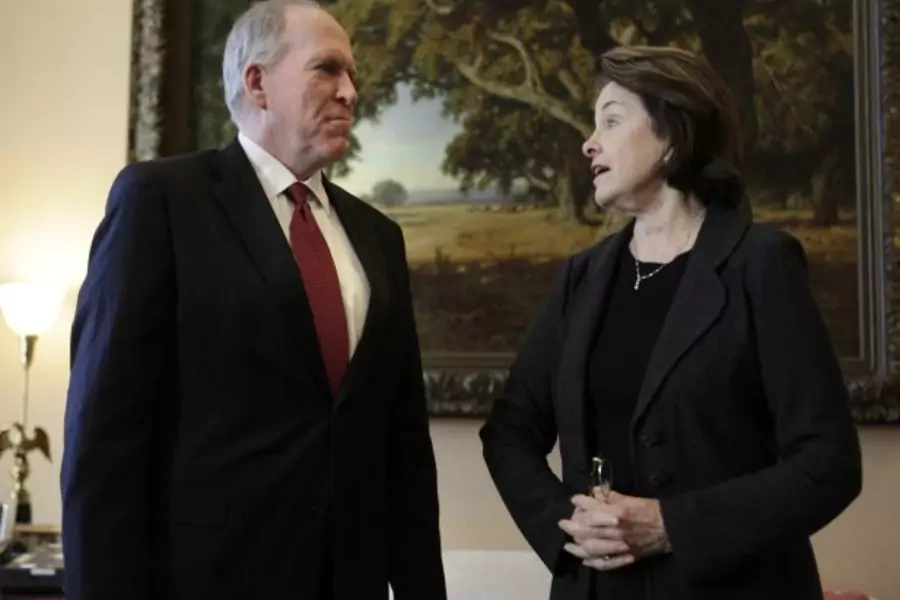John Brennan’s Confirmation Hearing and Targeted Killings

More on:
Today, John Brennan, White House homeland security adviser and deputy national security adviser for counterterrorism, will appear before the Senate Select Committee on Intelligence (SSCI) to discuss his nomination to become the director of the Central Intelligence Agency (CIA). Although he is expected to be voted out of the SSCI and approved by the full Senate, several committee members have raised lingering questions about Brennan. Senator John McCain noted: "I have many questions and concerns…especially what role he played in the so-called enhanced interrogation programs while serving at the CIA during the [George W. Bush] administration.” Last week, after Brennan made courtesy calls to the SSCI, Senator Ron Wyden’s spokesperson said the senator was frustrated by “the lack of transparency from the administration and the nominee,” specifically regarding their legal justification for killing American citizens, which will now reportedly be provided to the SSCI members. Similarly, Senator Mark Udall issued a press release that stated:
I was deeply disappointed today during my meeting with John Brennan. A few weeks ago, I had asked that he be prepared to discuss at today’s meeting the findings of the Senate Intelligence Committee’s comprehensive study on the CIA’s Detention and Interrogation program. Not only was he not prepared to discuss the important findings, but he hadn’t reviewed the report at all.
The concerns emphasized by these senators suggest that today’s confirmation hearing will focus primarily on what role (if any) Brennan played in the CIA’s detention and interrogation program, and the legal basis for killing U.S. citizens. Thanks to the extraordinary report by Amrit Singh of the Open Society Justice Initiative, we have some insight into the George W. Bush administration’s controversial detention and interrogation program: 136 known victims with the participation of 54 foreign governments. This serves as a useful corrective to the more limited scope of information offered in February 2008, when the former director of central intelligence Michael Hayden revealed in a SSCI hearing:
“[I]n the life of the CIA detention program, we’ve detained fewer than 100 people…fewer than one-third have had any of what we call the enhanced interrogation techniques used against them…waterboarding has been used on only three detainees.”
Two days later, Hayden told the House Permanent Intelligence Committee that he endorsed his earlier revelation because “waterboarding had become so much of the public discourse about the activities of the American intelligence community,” and “it was our strong belief that the political discussion that was going on was misshaped and misinformed.”
Based on this rationale, the Obama administration should reveal information about the process and scope of targeted killings, which are very much part of the public discourse today. However, if Congress is going to (finally) exert oversight into the Third War—spanning over ten years, four hundred strikes, and three thousand lives—the SSCI should broaden its focus beyond the targeted killings of Americans, and candidly discuss the full scope of who can legally be targeted. Of the more than three thousand people killed by the United States in its targeted killing campaign, only four were Americans—and only one or two were intentional targets. The concerns about the legal justification, processes, and procedural safeguards raised by the SSCI should be applied as rigorously for Americans and foreign citizens alike.
After reading confirmation hearing transcripts for the past ten directors of central intelligence, I would frankly be astonished if there is an in-depth discussion of targeted killings, which the Obama administration still maintains are covert (for CIA strikes at least). Following a predictive pattern, the nominee vows to provide greater information to congressional committees, argues that the intelligence community is politicized and needs to get out of the news, and plans to increase human intelligence gathering and improve foreign language skills. In addition, compared to other committees that play a role in vetting presidential nominations, the SSCI is more sober, bipartisan, and adult. (As I noted last month, when Senator Roy Blount tried asking David Petraeus about drones in 2011, Senator Dianne Feinstein interrupted the discussion several times. She will be chairing today’s session.)
Finally, in January 1981, during the confirmation hearing for William Casey to head the CIA, a young senator raised the issue of Casey’s close friendship with president-elect Ronald Reagan:
In my limited experience here in the Senate, that most times the personal relationship of an individual officeholder to the President has more effect upon the formulation of policy than the institutional relationship that person might have. To be more specific, we have seen, to my chagrin, where the less important job of national security adviser, than the job of Secretary of State, the degree of the personal relationship effects policy more than the degree of the institutional relationship. And you are a very close friend of the President of the United States of America. You have been his friend for some time, as I understand it…So, I would suspect that your role, a very important role, as DCI, coupled with your personal friendship, you may have more personal influence upon policy than other DCI’s have had-we haven’t had DCI’s very long-other heads of CIA have had, not only in terms of influencing policies as they relate to the intelligence community, but also affecting policy as it relates to a broader range of foreign-policy options.
That young senator was Joseph R. Biden, Jr., whose concerns from 1981 mirror the close personal relationship between Brennan and the president today. Obama administration officials describe Brennan as a "priest whose blessing has become indispensable." The problems posed by a director of central intelligence as close to the president as perhaps the national security adviser, or the director of national intelligence, should be questioned by SSCI as well.
More on:
 Online Store
Online Store